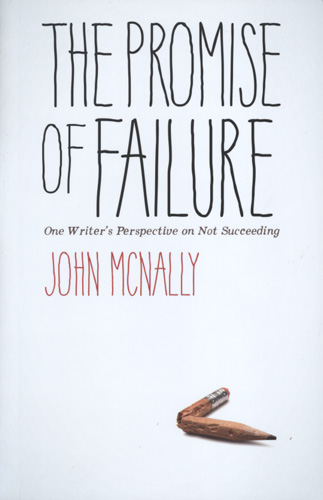The Promise of Failure
Reading the title of John McNally’s book, The Promise of Failure: One Writer’s Perspective on Not Succeeding, I wondered if, in the end, I would get good news or bad.
Reading the title of John McNally’s book, The Promise of Failure: One Writer’s Perspective on Not Succeeding, I wondered if, in the end, I would get good news or bad.
McNally has been writing for 36 years, “—almost forty years if you include the book I wrote in grade school that was rejected by every major publisher in America,” he writes. “I’m sure I’m not alone among writers who’ve been writing this long or longer who wonder, even as we plan what to write next, why bother.”
For starters, according to McNally: “In this profession, failure isn’t just a fact of life; it’s a necessary part of the process.” And: “For me, the reason I continue on is partly because it’s the only thing I’m even remotely good at.” What’s more, he writes: “A failed project one year may be a successful project twenty years later,” adding that “you have to write a certain amount of stuff that doesn’t work to get to the stuff that works.”
With these words in mind, McNally suggests you consider reinventing those writings that so far aren’t cutting it:
If one aspect of your writing life has stalled out, channel it into another genre, another subject. [ . . . ] Your new direction may not always work out, but even if it doesn’t, it may be enough of a catalyst to reenergize you artistically.
He explains that his novel The Book of Ralph began as a short story. Another novel, America’s Report Card, began years earlier as a “failed essay.”
McNally works on multiple projects at a time. In this way he’s written or edited seventeen books, collaborated on movie and TV projects, and teaches at Pacific University in Oregon. But the years haven’t necessarily brought him constant success. He explains that amid all his acceptances, he’s received “rejections, in some cases many, many rejections.”
Throughout his career, McNally’s formed some interesting ideas on revising stories. He acknowledges that some of his revisions take years, here again due to having so many different projects in the works. But fundamentally, he says that he was just slow to learn the revision process:
I’d thought revision was all about finding the right words, working on pacing, varying syntax, and so on—and it is about all of those things, but all of those things should be in the service of figuring out what the story is really about. Revision is also about being open to that discovery.
In more personal portions of The Promise of Failure, McNally discloses his sufferings with depression, beginning during his grade school years: “over the decades the depressions would become more prolonged, more debilitating.” When he was thirty-seven and beginning a new job, “everything felt as though it were swirling down the drain. My only reprieve was writing.” He continues: “Writing The Book of Ralph was my lifeline, and I clung to it each day.”
He still, in his 50s, has bouts of depression. “I’m not unique. Nearly everyone I know, whether a writer or not, suffers from depression to some degree. The difference is that writers write about it.” He supports this point with a list of authors the likes of Sylvia Plath, William Styron, Caroline Knapp, and Greg Bottoms, who either suffered mental illness or had people close to them affected.
McNally then turns his observations in a different direction:
Talking about writing can be detrimental, especially if you yourself aren’t writing much. I teach writing to graduate students; I give public lectures about writing; I give interviews about writing. At some point, you start feeling like a fraud.
But then, “I don’t know of many writers, regardless of what they’ve accomplished, who are happy with all aspects of their career.”
Nevertheless, McNally includes several quite funny anecdotes, including details about the few months he holed up in a camper to embrace the solitude he felt was necessary to produce good writing. The result? “By the end of my seven-month stint in the trailer, I’d written a pathetic thirty pages, none of them usable.”
In summing up this autobiographical/advice book, McNally offers these words worth noting:
I measure my goals not by a typed page, not by a paragraph, not by a sentence. But by a word. One word. Because I know well enough now that one word will lead me to the next word and that this is how you get to where you’re going. So here’s my advice on rejection and failure. Close this book, pick up a pen and paper, and put down a word. And then put down another word. And then another.
To my initial uncertainty of whether this book would offer good news or bad: sounds like good news to me.





